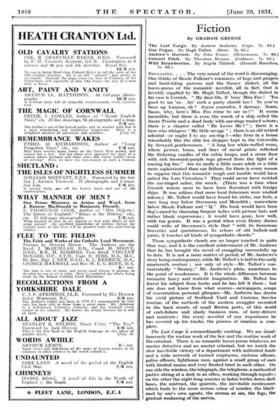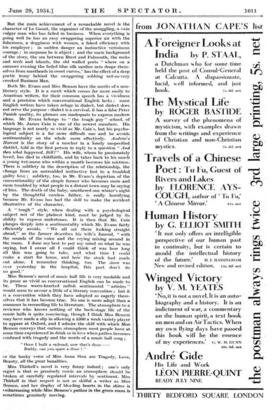Fiction
By GRAHAM GREENE
7s. 6d.)
SMUGGLING. . . The very sound of the word is discouraging. One thinks of Meade Falkner's romances, of kegs and gaugers
and hard-riding parsons and the Sussex dialect, all the hocus-pocus of the romantic novelist, all in fact . that is lavishly supplied by Mr. Hugh Talbot, though the dialect in
his case is Cornish. " My dear life, if 'tesn' Miss Feo ! 'Tes good to see 'ee. An' such a party cheeld too 1 So you've been up Lunnon, eh ? Joyen yourselve, I daresay. Saam, Saam, why, here's Miss Feo come to see us !" It seems incredible, but there is even the wreck of a ship called the Santa Tritata and a dead body with ear-rings washed ashore; there is a chapter called " He Loves Me 2 " ; there is a hero who whispers " My little savage " ; there is an old retired admiral—or ought I to say sea-dog ?—who lives in a house remarkably like the olde tea shoppes kept in the Cotswolds by decayed gentlewomen. " A long low white-walled room, where pewter, brass, and lines of naval prints reflected the flickering candles of the cabin lamps, and a stone floor with rich brownish-purple rugs glowed from the light of a roaring log fire." Are we really a little more adult or a little more sophisticated than our fathers, for there is every reason to suppose that this romantic rough and tumble would have suited the Late Victorians ? They could never have resisted the ear-ringed sailor, the wreck. (There was a time when Cornish waters seem to have been flocculent with foreign ships. It was seldom that mere local fishermen were washed ashore.) Mr. Talbot would have found his niche, one feels, a very long way below Stevenson and Meredith ; somewhere below Meade Falkner and " Q." His book would have been dog's-eared by charming Sargent ladies with picture hats and rather blank expressions ; it would have gone, how well, with tea gowns. It was a period when even Henry James could write of Stevenson's style that " with its humorous braveries and quaintnesses, its echoes of old ballads and yarns, it touches all kinds of sympathetic chords."
Those sympathetic chords are no longer touched in quite that way, and it is the excellent achievement of Mr. Andrews that he has brought the novel of smuggling successfully up to date. It is not a mere matter of period, of Mr. Andrews's story being contemporary, while Mr. Talbot's is laid in the early nineteenth century ; nor only of style—Mr. Talbot's con- centratedly " literary," Mr. Andrews's plain, sometimes to the point of woodenness. It is the whole difference between romantic fancy and realistic imagination. Mr. Talbot has learnt his subject from books and he has left it there ; but one does not know from what sources—newspapers, scraps of conversation, personal glimpses—Mr. Andrews has drawn his vivid picture of Scotland Yard and Customs Service routine, of the methods of the modern smuggler recruited in the back streets of small Breton ports, of this world of crab-fishers and shady business men, of lorry-drivers and receivers ; like every novelist of any importance he has covered up his tracks, the process of creation is com- plete.
The Last Cargo is extraordinarily exciting. We see simul- taneously the routine work of the law and the routine work of the criminal. There is no romantic hocus-pocus whatever, no master detective and no master criminal, but we watch the slow inevitable victory of a department with unlimited funds and a wide network of trained employees, customs officers, police officers, lighthouse men, against a small group of men with limited means and very limited trust in each other. On one side the wireless, the telegraph, the telephone, a methodical justice sitting at a desk in an office, working through reports ; on the other the night-long scurries in laden lorries down dark lanes, the mistrust, the quarrels, the inevitable carelessness which leads to the more serious crime of murder, the black- mail by one's own agents, the storms at sea, the fogs, the gradual weakening of the nerves. But the main achievement of a remarkable novel is the character of Le Gaunt, the organizer of the smuggling, a vain vulgar man who has failed in business. When everything is going well he has an easy swaggering superior air with the fishermen, a dogginess with women, a faked efficiency with his employer ; in sudden danger an instinctive verminous courage ; in suspense he is abject ; and the main background of the story, the sea between Brest and Falmouth, the rocks and reefs and islands, the old walled ports " where on a summer evening the faded blue silk sardine nets drape them- selves from mastheads in sweet curves," has the effect of a deep poetic irony behind the swaggering sobbing not-so-very crooked Businegs Man.
Both Mr. Evans and Miss Benson have the merits of a non- literary style. It is a merit' which comes far more easily to American writers, for their common speech has a vividness and a precision which conversational English lacks ; some English writers have taken refuge in. dialect, but dialect does not serve the purpose : dialect is a survival, it has a false Peter Panish quality, its phrases are inadequate to express modern ideas.' Mr. Evans belongs to " the tough guy " school, of which Mr. James Cain is one of the newest members. His. language is not nearly so vivid as Mr. Cain's, but his psycho- logical subject is a far more difficult one and he avoids sentimentality on the whole more effectively. Andrew's Harvest is the story of a rancher in a 'lonely unspecified district, told in the first person in reply to a question " And then what happened, Bill?" His wife, whom he passionately loved, has died in childbirth, and he takes back to his ranch a young wet-nurse who within a month becomes his mistress. There is subtlety in the description of the relationship, the change from an untroubled instinctive lust to a troubled guilty love ; subtlety, too, in Mr. Evans's depiction of the conventionality of the simple farmer who becomes more and more troubled by what people in a distant town may be saying of him. The death of the baby, smothered one winters night by the thoughtful careless father, is really horrifying because Mr. Evans has had the skill to make the accident illustratiie of the character.
A " tough " style, when dealing with a psychological subject not of the plainest kind, must be judged by its ability to express undertones. It is then that Mr. Cain plunges deeply into a sentimentality which Mr. Evans fairly efficiently avoids. " We all sat there _looking straight ahead," so the farmer describes his wife's funeral, " with the sounds of the voice and the crying mixing around in the room. I done my best to put my mind on what he was saying, but I swear all I could think of was how long all this was going to take, and what time I could make a start for home, and hoiv the stock had made out alone. I remember thinking, too. The show was over yesterday in the hospital, this part don't do no good."
Miss Benson's novel of music hall life is very readable and its prose as vivid as conversational English can be made to be. These warm-hearted raffish sentimental artistes " Would seem to savour a little of a literary convention ; but it is a convention which they have adopted so eagerly them- selves that it has become true. No one is more adept than a mummer in reconciling life to literature. The atmosphere to a reviewer who knows nothing of the back-stage life of the music halls is quite convincing, though I think Miss Benson may have made a slip in allowing a £300 a week variety player to appear at Oxford, and I admire the skill with which Miss Benson conveys that curious atmosphere most people have at some time experienced in drink or in love when pathos becomes confused with tragedy and the words of a music hall song ; " Once I built a railroad, now that's done— Buddy, can you spare a dime Y " or the husky voice of Miss Anna Sten are Tragedy, Love, Beauty, all the great banalities.
Miss Thirkell's novel is very funny indeed ; one's only regret is that so genuinely comic an atmosphere should be broken at carefully regulated intervals by sentiment. Miss Thirkell in that respect is not so skilful a writer as Miss Benson, and her display of bh eding hearts in the shires is einbarrassing while Miss Benson's pathos in the green room is sometimes genuinely moving.





































 Previous page
Previous page